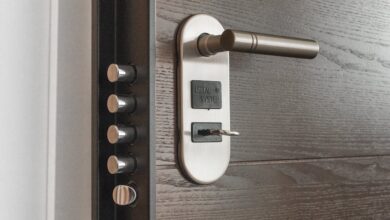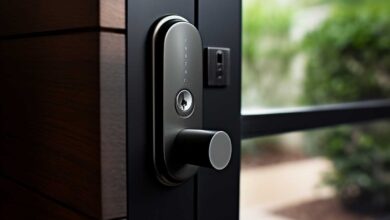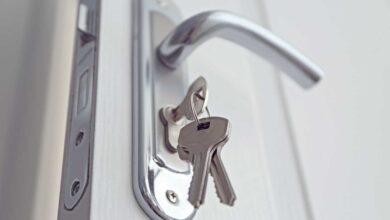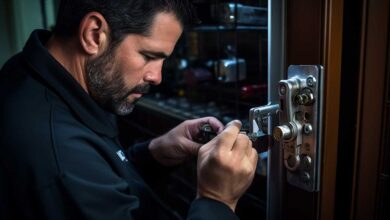Understanding the Technology Behind Smart Locks
KEY TAKEAWAYS
In an era where technology seamlessly intertwines with our daily routines, the realm of home security has witnessed transformative innovations, with smart locks emerging at the forefront. These advanced locking systems, transcending beyond traditional keys and bolts, offer homeowners a blend of enhanced security, convenience, and modern flair. The Smart Lock Market achieved a valuation of USD 2.04 billion in 2022 and is projected to reach USD 9.53 billion by 2030, exhibiting a compound annual growth rate (CAGR) of 21.2% during the forecast period of 2023-2030.
This guide will unravel the technology behind smart locks, delve into their varied types, helping you in understanding the technology behind smart locks, and explore the myriad of benefits they bring to the contemporary household.
What Is A Smart Lock?
A smart lock is a cutting-edge device that integrates Wi-Fi or Bluetooth capabilities, allowing users to bid farewell to traditional house keys. With just a tap on their smartphone or a voice command, users can lock or unlock their doors. One of the standout features of smart locks is the ability to grant remote access. Imagine being at work and unlocking your door to let in a guest or a delivery person; that’s the convenience a smart lock offers.
The technology behind smart locks is continually evolving. Some models are equipped with fingerprint scanning, while others seamlessly integrate with digital assistants and mobile applications. When considering a smart lock, it’s essential to evaluate its features and functionalities to ensure it aligns with your needs.
What Can A Smart Lock Do?
Smart locks have revolutionized home security by offering a plethora of customization features and functionalities. They surpass the capabilities of traditional locks in many ways:
-
Remote Control Via An App: Most smart locks come with dedicated iOS and Android apps, allowing users to control the lock remotely, monitor entries and exits, and receive alerts about any activity.
-
Real-Time Monitoring With Wi-Fi: With Wi-Fi connectivity, users can view entry and exit logs in real-time. This feature is especially beneficial for parents who want to ensure their children have safely returned home.
-
Bluetooth Connectivity: Bluetooth allows the smart lock to recognize and connect with your smartphone, unlocking your door as you approach.
-
Multiple Keyless Entry Options: From proximity unlocking with your smartphone to voice commands and fingerprint recognition, smart locks offer a range of keyless entry methods.
-
Permanent Or Temporary Entry Codes: Users can create permanent or temporary entry codes for guests, service providers, and family members.
-
Set Access Limitations: For added security, users can set access limitations based on days of the week or specific hours.
-
Auto-Lock Settings: If a door is left unlocked, the smart lock can be set to lock it automatically after a predetermined period.
-
Integration With Smart Home Devices: Smart locks can be integrated with other smart home devices. For instance, your smart lights can be programmed to turn on when the door is unlocked.
Benefits Of Using A Smart Lock
The adoption of smart locks is rapidly increasing and for a good reason. Here are some of the standout benefits:
-
Enhanced Security: Unlike traditional locks that can be picked, smart locks offer advanced security features, making unauthorized access challenging.
-
Convenience: Forget the hassle of physical keys. With smart locks, you can unlock your door with your smartphone, voice command, or even a fingerprint.
-
Remote Access: Whether you’re at work or on vacation, you can control your smart lock remotely, granting or denying access as needed.
-
Real-Time Alerts: Receive instant notifications on your smartphone about who’s entering or leaving your home.
-
Integration With Other Smart Devices: Smart locks can be integrated with other smart home devices, enhancing the overall security ecosystem of your home.
-
Temporary Access Codes: Grant temporary access to guests or service providers without the need to hand over physical keys.
-
History Log: Keep track of who accessed your home and when providing an added layer of security and peace of mind.
Types Of Smart Locks
Smart locks have become increasingly popular in recent years, offering enhanced security, convenience, and a plethora of features. As technology advances, various types of smart locks have emerged, each with its unique functionalities. Let’s delve into the different types of smart locks available in the market:
Traditional Locks
Traditional locks are the standard mechanical locks that have been used for centuries. They require a physical key to unlock. While they don’t offer the advanced features of smart locks, they are reliable and have stood the test of time. However, they lack the convenience and enhanced security features that modern smart locks provide.
Electronic Locks
Electronic locks represent the transition from traditional mechanical locks to modern smart locks. They often come with keypads where users can input a code to unlock the door. Some electronic locks also offer card access, where a specific card is swiped or tapped to gain entry. While they provide a higher level of security than traditional locks, they still don’t offer the full range of features that the latest smart locks do.
Entire Lock Solutions
Entire lock solutions refer to smart locks that replace your entire existing lock system. These are comprehensive systems that come with advanced features like Wi-Fi and Bluetooth connectivity, mobile app integration, and more. They offer:
-
Keypad And Combination Smart Locks: These locks require a master passcode to unlock your door. They may come with touchscreens or physical buttons. Many models can also integrate with other smart home devices.
-
Garage Door Locks: Smart locks for garage doors allow you to open your garage remotely. They often come with mobile app integration and provide notifications whenever the garage door is opened or closed.
-
WiFi Smart Locks: These locks can be paired with smart home hubs and allow you to lock or unlock your door from anywhere with a wireless connection.
-
Bluetooth Smart Locks: These locks connect directly with your mobile device, offering the same functionalities as Wi-Fi locks but without draining the battery as quickly.
Key Codes And Pin Codes
Key codes and pin codes are security features used in many electronic and smart locks. Users set up a unique code, which they input on the lock’s keypad to gain access. Some advanced smart locks allow users to:
-
Create Permanent Or Temporary Codes: This feature is especially useful for granting temporary access to guests or service providers without handing over a physical key.
-
Set Access Limitations: Users can set limitations on when a particular code can be used, adding an extra layer of security.
-
Fingerprint Smart Locks: These locks use biometric technology to scan a user’s fingerprint, offering a high level of security as fingerprints are unique and can’t be easily replicated.
-
Smart Safes: Beyond doors, smart technology is also being integrated into safes. These safes can be connected to apps, allowing users to monitor the safe, schedule self-diagnostic tests, and add trusted individuals to monitor the safe remotely.
How Smart Locks Work
Smart locks utilize cutting-edge technology, including wireless connectivity, biometric recognition, and remote access control, to enhance security and simplify access management. These locks have transformed the traditional key and lock mechanism, integrating it with modern technology to provide enhanced security features. Let’s delve deeper into the workings of smart locks:
Remote Access And Internet Connection
One of the primary features of smart locks is their ability to connect to your home’s Wi-Fi network. This connectivity allows smart locks to receive commands or codes remotely, either from a smartphone app or other integrated devices. With an active internet connection, users can lock or unlock their doors from virtually anywhere, ensuring they always have control over their home’s security.
Mobile Devices And Mobile Apps
Smart locks often come with dedicated mobile apps, turning your smartphone into a virtual key. These apps allow users to:
-
Control The Lock Remotely: Users can lock or unlock their doors from anywhere using the app.
-
Receive Notifications: Many smart locks send notifications to users if they forget to lock their doors, allowing them to secure their home with just a tap.
-
Manage Access Codes: Users can create, modify, or delete access codes directly from the app, granting or revoking access as needed.
-
Monitor Activity: The app often provides a log of when and by whom the lock was accessed, offering an added layer of security.
Video Doorbells And Smart Speakers
The integration of smart locks with other smart devices, such as video doorbells and smart speakers, amplifies their functionality. For instance:
-
Visual Verification: With a video doorbell, users can see who’s at their door and then decide whether to grant access using their smart lock.
-
Voice Commands: Integration with smart speakers like Google Home or Amazon Echo allows users to lock or unlock their doors using voice commands. Simply saying, “Hey Google, lock the front door,” can secure your home.
Access Code Systems With Keyless Entry
Many smart locks feature a numeric keypad, allowing users to enter a unique access code to unlock the door. This keyless entry system offers several advantages:
-
Multiple Access Codes: Users can create up to 30 unique access codes, granting entry to various individuals like family members, guests, or service providers.
-
Temporary Codes: For short-term visitors or service providers, users can create temporary codes that expire after a set duration.
-
Enhanced Security: The keyless functionality eliminates the risk associated with lost or stolen keys. Moreover, users can easily change or delete codes if they suspect any security breaches.
Benefits Of Using Smart Lock Technology
The integration of technology into our daily lives has brought about numerous advantages, especially in the realm of home security. Smart lock technology, in particular, has emerged as a game-changer, offering a blend of convenience, enhanced security, and cost savings. Let’s delve deeper into the benefits of using smart lock technology:
Convenience & Security Features
-
Increase Accessibility Without Compromising Security: Traditional keys are often misplaced, leading to security concerns. Smart locks, especially those with keypads, eliminate this concern. For instance, models like the TL 115 allow users to unlock doors using Bluetooth technology on their smartphones. Users can also assign individual passcodes to family members, enabling monitoring of each member’s entry and exit.
-
Remote Access: Smart locks, such as the Turbolock Plus, can be controlled remotely via smartphones. This feature is particularly beneficial for vacation rentals, visiting relatives, or elderly family members who might need assistance.
-
Simplified Home Security: Smart locks allow users to grant access to multiple individuals and monitor who enters or exits the home. With dedicated apps, users can control and monitor their home’s security, assign new passcodes, and ensure their home remains secure.
-
Boosted Connectivity: Integration of smart locks with other smart home devices enhances overall home security. For instance, if someone forgets to lock the door, certain smart locks can automatically activate the locking mechanism.
-
Multiple Locking And Unlocking Options: Smart locks offer various methods for securing and accessing properties. From traditional locking mechanisms for those not comfortable with technology to advanced Bluetooth and Wi-Fi-based systems, users have a plethora of options.
-
Cost Savings: Wireless access control systems, like smart locks, offer significant cost savings during installation. Choosing wireless locks over wired ones can result in labor savings of up to 82.5%.
Energy Efficiency & Cost Savings
-
Cost-Effective Installation: Wireless access control systems, like smart locks, offer significant cost savings during installation. For instance, ASSA ABLOY’s report suggests that choosing wireless locks over wired ones can result in labor savings of up to 82.5%. This is because wireless installations are faster and less intrusive.
-
Energy Savings During Use: Energy efficiency is a critical concern for businesses and homeowners alike. Wireless, battery-powered locks consume significantly less energy than traditional wired locks. While wired locks often work via magnets connected to electricity continuously, wireless locks only activate when presented with a credential, leading to energy savings of over 70% over the lock’s lifetime.
-
Extended Lock Life And Flexibility: High-quality wireless locks can be reinstalled at different doors without affecting their reliability. This flexibility can lead to cost savings, especially when reconfiguring office spaces or adapting to flexible work patterns.
-
Case Study – University of St Andrews: The University of St Andrews, known for its environmental initiatives, chose ASSA ABLOY’s Aperio battery-powered electronic escutcheons for its student accommodations. These devices integrate seamlessly with the university’s central system and student ID cards, offering energy efficiency and centralized control. The Aperio devices are wireless, leading to minimal energy consumption during installation and operation, aligning with the university’s sustainability goals.
Frequently Asked Questions
To help you in understanding the technology behind smart locks, we’ve answered some of the most frequently asked questions.
Are smart locks more secure than traditional locks?
While traditional locks have been reliable for centuries, smart locks offer advanced security features such as encryption, remote access, and real-time notifications, making them a more secure option in many scenarios.
Can I install a smart lock on any door?
Most smart locks are designed to fit standard doors. However, it’s essential to check the specifications and compatibility of the smart lock you’re considering with your door’s measurements and type.
What happens if the battery of my smart lock dies?
Many smart locks offer multiple power sources, such as a backup battery or a traditional key option. It’s always a good idea to regularly check the battery level and have a backup plan in place.
Can smart locks be hacked?
Like any electronic device, smart locks can be vulnerable to hacking. However, reputable brands invest heavily in encryption and security protocols to minimize this risk. Regularly updating your smart lock’s software can also help in keeping it secure.
Do I need a professional to install a smart lock?
While some people prefer professional installation to ensure everything is set up correctly, many smart locks are designed for DIY installation, with step-by-step instructions provided.
How long do smart locks last?
The lifespan of a smart lock depends on its build quality, usage, and maintenance. On average, a smart lock can last anywhere from 5 to 10 years with regular software updates and proper care.
Understanding The Technology Behind Smart Locks
In today’s digital age, smart locks represent the future of home and office security. They seamlessly blend traditional locking mechanisms with advanced technology, offering unparalleled convenience, security, and cost savings. As we continue to integrate technology into every facet of our lives, the importance of understanding and embracing innovations like smart locks becomes paramount. Whether you’re considering an upgrade to your home security or just curious about the latest advancements, we hope this comprehensive guide has provided valuable insights into the world of smart locks. Secure your peace of mind and step into the future with confidence.
Learn more about the right lock for securing your home by reading our comprehensive guide on choosing the right smart lock for your home. Visit Security Forward to find more information and browse through the available resources.





